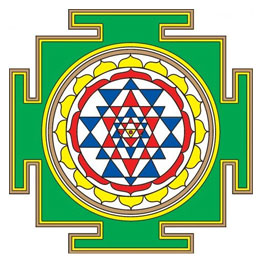History of Yoga
Home / History of Yoga
Yoga Intro/History
Yoga
The Vedic system considers the confluence of body, mind and soul as the tripod of existence. While the body and mind can fall under the domains of health and disease, the soul or the all-energetic and eternal Aatman is beyond any flaw. The sister sciences of Ayurveda and Yoga attend to the healing of the sick body and mind and propel the purpose of life beyond just biological existence towards the ultimate self realization which marks the union of the Jeeva with the Paramatman.
Yoga achieves the purpose through a very well organized eight-fold sequential process known as the Ashtaanga Maarga consisting of Yama, Niyama, Asana, Pranayama, Pratyaahara, Dhaarana, Dhyaana and Samaadhi. These yogic processes gradually take us from the simplest to the most complex and finally onto the ultimate destination of self-realization.
Sri Yantra
Sri Yantra is one of the most auspicious, important and powerful Yantras, which not only gives the maximum benefit, but also proves beneficial for almost everybody. It is the source of attaining all worldly desires & fulfilling all wishes through inner cosmic power & mental strength. "Shree Yantra" - Shree meaning wealth and Yantra - Meaning "Instrument" - The Instrument for Wealth.
The Shree Yantra brings about material and spiritual wealth. Sri Yantra has that unexplained power to fulfill all our wishes and change our life for the better.

History of Yoga
The eternal principles of Yoga are of divine origin and the practice of the same falls in line with the evolutionary progress of the human civilization when man first realized his spiritual potential and began to develop techniques to enrich it. The yogic science was slowly elaborated and developed by ancient Rishi scientists from all over the world. The essence of yoga has often been shrouded in or explained by different symbols, analogies and languages.
The yoga we know today was developed as a part of the tantric civilisation which existed in India and all parts of the world more than ten thousand years ago. In archaeological excavations made in the Indus Valley at Harappa and Mohenjodaro, now in modern Pakistan, many statues have been found depicting deities resembling Lord Shiva and Parvati performing various asanas and practising meditation. These ruins were once the dwelling place of the Indus-Saraswati civilisation that started to flourish in the Indus subcontinent. According to tradition, Shiva is said to be the founder of yoga and Parvati, his first disciple.

